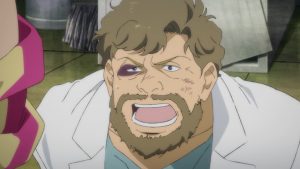 Without any question, Banana Fish is an interesting anime. For me it’s interesting in its own right, and interesting in the way I’m processing it as a viewer. It’s clearly several steps up in weight class from the typical series, both in terms of ambition and frankly, overall quality (though others may disagree about that). Yet I find myself really struggling to embrace it, if not appreciate it – it’s like a performance of a symphony that’s overall impressive, but has several discordant notes which stand out on every listen.
Without any question, Banana Fish is an interesting anime. For me it’s interesting in its own right, and interesting in the way I’m processing it as a viewer. It’s clearly several steps up in weight class from the typical series, both in terms of ambition and frankly, overall quality (though others may disagree about that). Yet I find myself really struggling to embrace it, if not appreciate it – it’s like a performance of a symphony that’s overall impressive, but has several discordant notes which stand out on every listen.
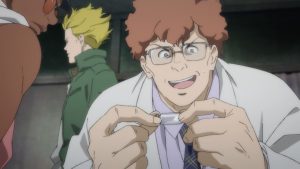 Along those lines, I can’t shake the feeling that it was a significant mistake to update the setting from the manga. On the surface it doesn’t seem like a big deal, but a lot of those off notes I’m talking about spring from the disconnect between the tone and substance of the story and the setting. This is not a gritty and realistic series – it’s plenty violent, but in a very theatrical way. All of the hammy dialogue and posing for the camera – it would have felt less obtrusive in a period piece that would have already seemed to be at a remove from the present. The same goes for the sexual politics and the rampant murder on New York’s streets and the MacGuffin – the whole Banana Fish-LSD hook plays 100% like something out of a post-Vietnam drama. Which, to be fair, is exactly what Banana Fish originally was.
Along those lines, I can’t shake the feeling that it was a significant mistake to update the setting from the manga. On the surface it doesn’t seem like a big deal, but a lot of those off notes I’m talking about spring from the disconnect between the tone and substance of the story and the setting. This is not a gritty and realistic series – it’s plenty violent, but in a very theatrical way. All of the hammy dialogue and posing for the camera – it would have felt less obtrusive in a period piece that would have already seemed to be at a remove from the present. The same goes for the sexual politics and the rampant murder on New York’s streets and the MacGuffin – the whole Banana Fish-LSD hook plays 100% like something out of a post-Vietnam drama. Which, to be fair, is exactly what Banana Fish originally was.
 Be that as it may, there’s certainly a compelling plot playing out here. I don’t real feel Ash as a likeable or engaging protagonist, to be honest, but Max is a different matter. For me Banana Fish would probably have been more interesting if it was about him than Ash, but that wouldn’t have worked for what the mangaka was going for. For me Ash comes off as a cocky kid who’s too smart for his own good and brings on most of his own problems. There are good reasons he ended up that way – the slivers of his backstory that we’ve seen are ample proof of that. But that doesn’t make his personality any more winning.
Be that as it may, there’s certainly a compelling plot playing out here. I don’t real feel Ash as a likeable or engaging protagonist, to be honest, but Max is a different matter. For me Banana Fish would probably have been more interesting if it was about him than Ash, but that wouldn’t have worked for what the mangaka was going for. For me Ash comes off as a cocky kid who’s too smart for his own good and brings on most of his own problems. There are good reasons he ended up that way – the slivers of his backstory that we’ve seen are ample proof of that. But that doesn’t make his personality any more winning.
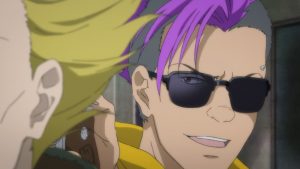 I know this much – I’m ready for the whole prison arc to be over, as the story outside is a lot more interesting than the one inside the walls. The obsessive, almost leering fascination with prison rape is already wearisome – we get it already. Meanwhile we have more compelling stuff going on outside, where Shorter has arrived at the doctor’s office just in time to prevent some really bad stuff going down as far as the doc, his nurse and Eiji are concerned. But not, sadly, for Griffin, who rouses at the sound of the voice of Dino’s drug man and gets himself shot by him in the process.
I know this much – I’m ready for the whole prison arc to be over, as the story outside is a lot more interesting than the one inside the walls. The obsessive, almost leering fascination with prison rape is already wearisome – we get it already. Meanwhile we have more compelling stuff going on outside, where Shorter has arrived at the doctor’s office just in time to prevent some really bad stuff going down as far as the doc, his nurse and Eiji are concerned. But not, sadly, for Griffin, who rouses at the sound of the voice of Dino’s drug man and gets himself shot by him in the process.
 Was it this man that Griffin was literally talking about when he said “Banana Fish”? I have my doubts, but I suppose it’s possible. Fortunately the doctor has reserved a sample of the vial Ash brought him, so the quest for the truth will continue on that end. But whatever secrets Griffin knew he’ll seemingly take to the grave, as he dies in the office (a hospital not being an option under the circumstances). Ibe, meanwhile, threatens to send Eiji back to Japan now that the mafia knows he’s connected with Ash – which, frankly, sounds like a pretty sensible idea to me. But if that happened we wouldn’t have the story we’re destined to have.
Was it this man that Griffin was literally talking about when he said “Banana Fish”? I have my doubts, but I suppose it’s possible. Fortunately the doctor has reserved a sample of the vial Ash brought him, so the quest for the truth will continue on that end. But whatever secrets Griffin knew he’ll seemingly take to the grave, as he dies in the office (a hospital not being an option under the circumstances). Ibe, meanwhile, threatens to send Eiji back to Japan now that the mafia knows he’s connected with Ash – which, frankly, sounds like a pretty sensible idea to me. But if that happened we wouldn’t have the story we’re destined to have.
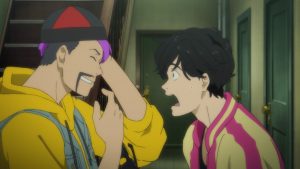 Max and Ash both seem on the verge of being sprung, happily – through the efforts of the former’s lawyer and of Charlie calling in a favor for the latter. The news of Griffin’s death seems to take the steam out of Ash’s resentment for Max rather than fuel it, interestingly. They share a few hits of smuggled “Golden Eagle” bourbon (I love that take on the warning label) and Ash tells Max what he knows – realizing, certainly, that Max is his best hope for finding out what happened to his brother. With the both of them back in society and the story following the trail of Banana Fish, perhaps some of the issues I’m having with the series will be less obtrusive in coming episodes – I certainly hope so, because as much as I like this series I want to do so with a lot more abandon than I currently can.
Max and Ash both seem on the verge of being sprung, happily – through the efforts of the former’s lawyer and of Charlie calling in a favor for the latter. The news of Griffin’s death seems to take the steam out of Ash’s resentment for Max rather than fuel it, interestingly. They share a few hits of smuggled “Golden Eagle” bourbon (I love that take on the warning label) and Ash tells Max what he knows – realizing, certainly, that Max is his best hope for finding out what happened to his brother. With the both of them back in society and the story following the trail of Banana Fish, perhaps some of the issues I’m having with the series will be less obtrusive in coming episodes – I certainly hope so, because as much as I like this series I want to do so with a lot more abandon than I currently can.


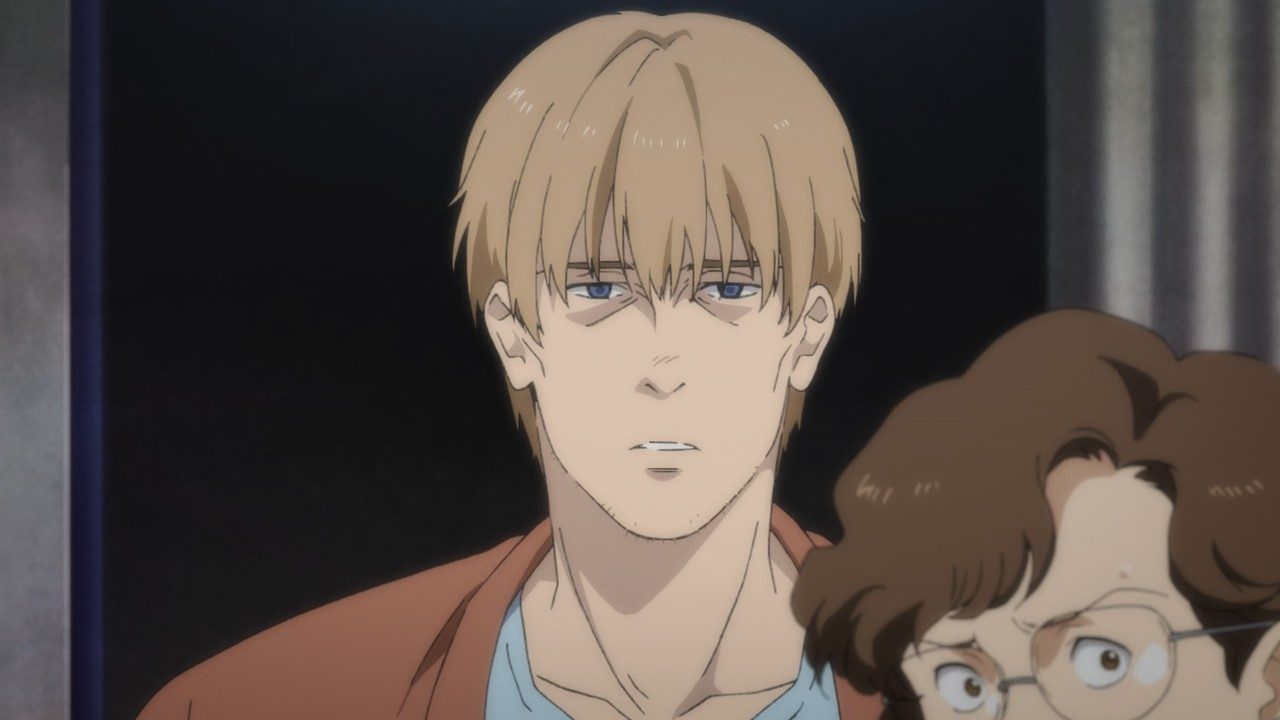
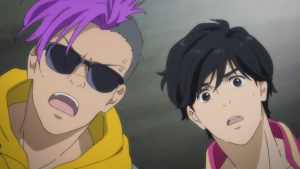

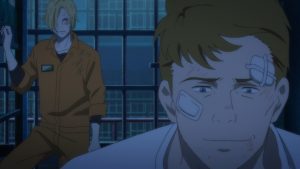
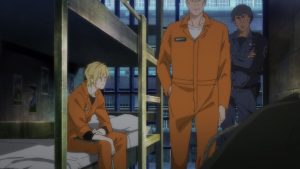
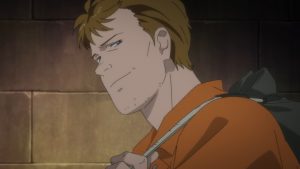
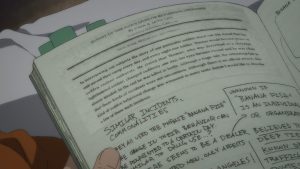
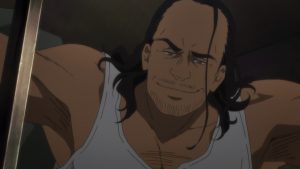
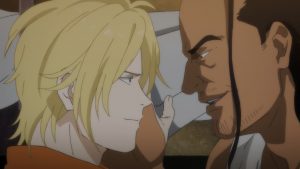
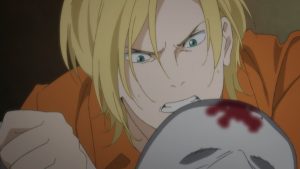


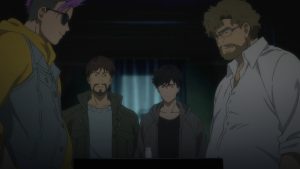
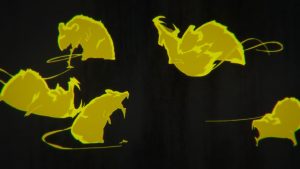

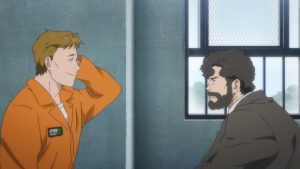
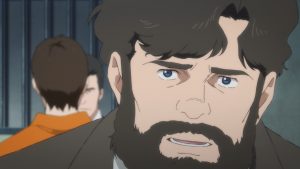
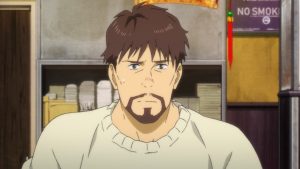
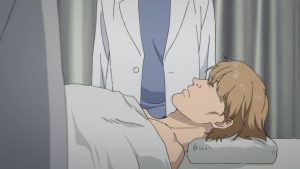
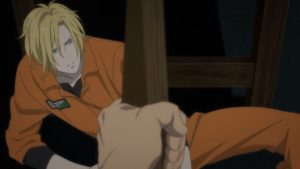
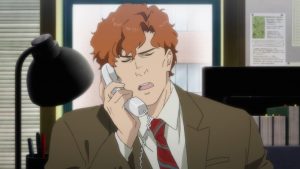
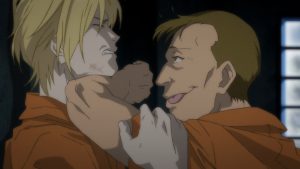
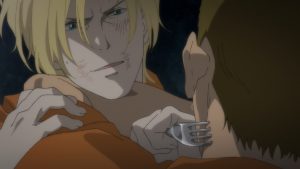
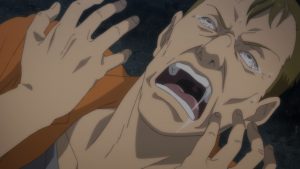
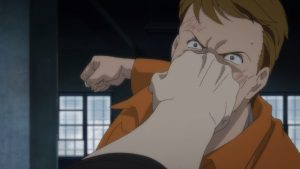
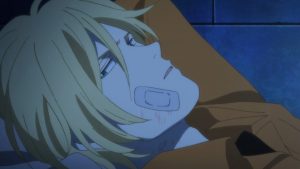
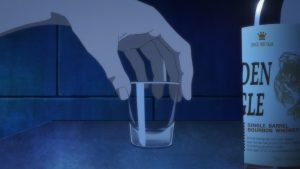
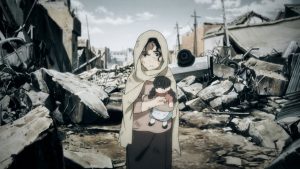
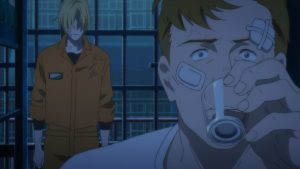

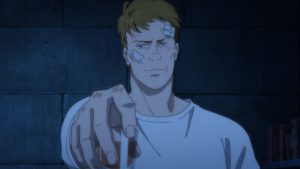
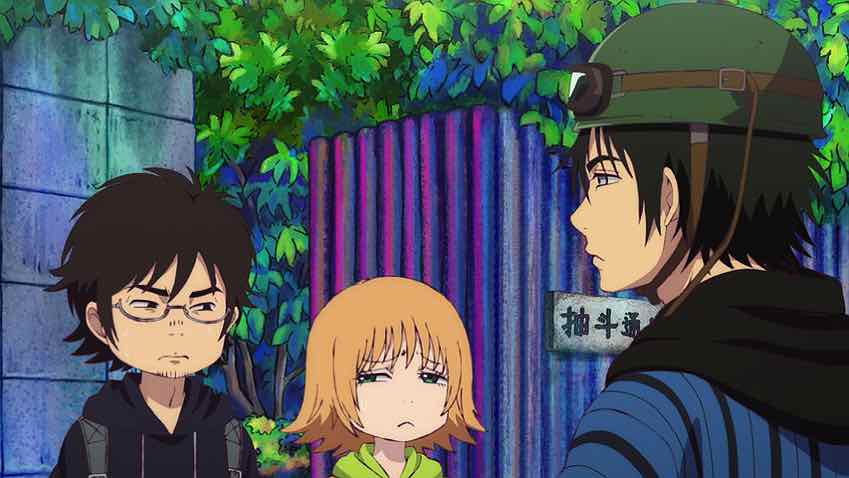
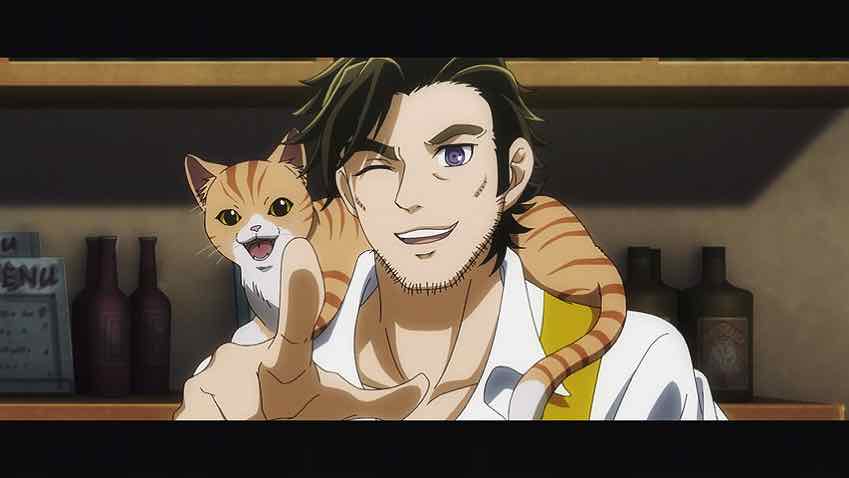
elianthos80
July 27, 2018 at 8:32 am– The one thing I am disagreeing about here mostly is the posturing for the camera and it being a bad thing(?). It comes close to posturing when Ash briefly puts the seductive face act with the Bull dude but duh the camera there is subbing for said dude’s eyes taking the bait. Otherwise… pretty functional choices.
And I’m biting my tongue on the supposed prison rape obsession thing because… oh my sweet summer
childrenotaku guys. This is not necessarily about you Enzo btw ( regardless of your birthday :P), but based on a few comments I’ve red here and there since last week. But seriously among other things if I hadn’t watched the actual episodes I’d think you were talking about Under Grand Hotel or something similar. Seriously.– Talking of the aforementioned Lynx bait… what happens later with Dino’s prison lackeys shoud make clear that yes Ash let them do the do last week only because they happened to give him a chance at the infirmary when he needed it. Hardcore cleverness or hardcore stupidity on going that far to achieve his goals? YMMV. But as forks go this week I can only say well done ^____________________^ please stab them more where it hurts ^________________^ .
– Also on the character’s front… likable or not Ash’s cockyness is a shield and I’m prone to conced him all the protective weapons he can muster given the circumstances. Whe most people ‘like’ towards him tend to be unsavory and basically disgusts him that’s one way to survive. And while every survivor copes in uniquely individual ways that kind of front is a thing and can be a very visceral need. Plus as a gang leader of sort some attitude is a requirement possibly.
For me it’s not even a question of liking him as a character or not. He acts and speaks in CSA PSTD code, I intimately know that code, he makes sense within it and I want to see his journey within this plotty quest. And how the thick plottens by the episode – also the death count is rising, just in case we relax too much after one dodged danger or two 😛 – .
– Purple mohawk guy to the rescue and master of disguise to boot! :,D
– Eiji is all in on the Help Ash mission but he really needs to level up somewhat and as fast as his reflexes. I am quite looking forward to his journey too.
– Max first bribes the guard to change cellmates (understandable, plus he has kids woes) then worries way later about who is going to be Ash’s next cellmate hence trouble for the teen. Tut tut. Given how that is not an instant change to effect he coud have thought about his moves a bit better He Oh Wise Nominally Adult. But they managed to connect at last over their shared sorrow at least. An alliance is being born! Huzzah.
– ‘He finished high school only because I taught him math’ thank you Mr. Good Cop for the leverage levity :,)
Guardian Enzo
July 27, 2018 at 8:35 amAnd I’m biting my tongue on the supposed prison rape obsession thing because… oh my sweet summer children otaku guys.
The problem with writing stuff that’s service for a specific audience is, you pretty much lose everyone who isn’t part of that audience. Nothing wrong with that, it’s artistic license, but it is what it is.
elianthos80
July 27, 2018 at 9:47 amOk, I’m unbiting. Keep in mind that unlike many works with such themes published before or after BF 1)was not published in a BL magazine – by design and evolution BL is a niche -. BF was aiming for a wider readership since its inception. Fewer magazines + less market fragmentation + fewer labels 2) its readership allegedly included also a rather substantial male following – BF was a crossover audience best seller. It has action, a mystery to solve, blood and violence, a sprinkle of romance, snappy pace, survivor/underdog tale, revenge story, rather articulated plot, lit refs if one is so inclined… specific audience? If you like any of these you’ll find something to chew upon -.
3) while a female readership might be more receptive to sexual abuse because it looms over them much more by statistics comparison, rape and/or sexual abuse recurrence if any was not just a shoujo manga thing
4) for this specific subject matter the presentation in BF is really and blessedly restrained
5) tied to the previous points: it is something that happens in BF, it happens frequently/it is an always possible menace, if it is wearisome when it happens it’s meant to be wearisome/distressing rather than fanservicy [hint: BF does not take the fanservice route but the consequences route] but it’s still part of a whole rather than the whole story – see point 2) above – .
It works for what it is here and it still does a much better job approaching the subject than works published or aired since (any demographic) even when some other aspects that ties into it are now dated or controversial.
Ironically enough I am not hot on rape in my media but BF brand of awareness of what it means and siding with the abused down to what it shows/tells ( and what it does not ) is what makes it work ad makes it bearable even when it pops up a number of times vs other works when it might happen once but feels just or mostly explotative/vouyeristic/what have you – the latter I find so utterly wearisome it’s enough for me to drop a work or severly affect my final evaluation of it – :).
Stöt
July 28, 2018 at 3:13 amYeah, I’m with you Elianthos. I can’t see how this is in anyway fan service for some BL audience. This is the reality for some, and it’s awful. To ban it’s portrayal in a story, or claim it’s put in this story as fan service is both dumb and insulting (to the author and any victim). Enzo is clearly uncomfortable with it though, and it’s up to him to go through life and literature with blinkers https://en.wikipedia.org/wiki/Blinkers_(horse_tack)
Guardian Enzo
July 28, 2018 at 3:21 amWho the flying fuck said anything about banning, for Christ’s sake?
There are plenty of examples I could point to (on this site, in fact) where this sort of this is used as part of a story, and I have absolutely no problem with it. It so happens in this case I see a certain prurient glee in the way the author continues to serve up the same dish, time after time, to the point where it’s there for more than strictly narrative purposes. Does it “bother” me? In the sense of being not especially good writing, sure – but not in the sense that you’re implying in your puerile way.
Stöt
July 29, 2018 at 12:22 pm@elianthos80 I may have broken Enzo’s profanity filter, but I guess he immediately compensated with some other words. I don’t expect these things https://books.google.com/ngrams/graph?content=puerile%2Cprurient&case_insensitive=on&year_start=1800&year_end=2008&corpus=15&smoothing=7&share=&direct_url=t4%3B%2Cpuerile%3B%2Cc0%3B%2Cs0%3B%3Bpuerile%3B%2Cc0%3B%3BPuerile%3B%2Cc0%3B.t4%3B%2Cprurient%3B%2Cc0%3B%2Cs0%3B%3Bprurient%3B%2Cc0%3B%3BPrurient%3B%2Cc0
in the comment section of a blog, ( is Enzo born in the 1800’s? who knows). Or maybe it’s just unique to the comment section of this blog in general. It’s extremely unwelcoming, and always has been. A lot of it has to do with how our Dear Leader interacts with his audience and deals with criticism, I must say.
Eli, I thoroughly agree with the rest of your comment. Banana Fish is dealing with it respectfully and somberly, and it makes little sense to single out BF as pandering to some perverted audience. It does serve as a convenient excuse if the thing it portrays itself is unwanted, and I think Enzo should do some soul searching on whether that is the case. I don’t think his argumentation holds upon inspection.
That said, I’ve never been a fan of the speaking of “codes”. I feel it serves mostly to isolate people from people, and inherently suggest that empathy is not enough to understand anyone. I’m still hoping empathy, tolerance and storytelling is the best way forwards, and that we should all strive for more of it. But also, I’m very sorry to hear very nasty sh**t happened to you
Stöt
July 29, 2018 at 12:45 pm@Enzo Yes, please show me where “this sort of this is used as part of a story, and [you] have absolutely no problem with it.”. I’m willing to bet that very few deals with it as respectfully as Banana Fish did here. Where’s the exploitation? off screen? As Elianthos said, We have shown precious little of the actual abuse itself but rather the buildup/motivations and especially the consequences of it.
Also, I spoke about banning. Just now. It felt like the logical conclusion when even the mentioning of rape is too salacious
Yukie
July 27, 2018 at 9:37 amAlso had a few issues with this ep: I enjoyed the pacing in the first three episodes, but in this episode it felt they kind of lost their balance and ended up just cramming in as many plot points as they can. There were some jarring transitions between scenes that gave me whiplash and that made it hard to stay engaged.
There were also several plot points that showed up that made me kind of worried about how the plot will progress from here (like Arthur’s obsession with destroying everything Ash cares about etc.)… with my main concern being how the mangaka plans to have Eiji remain in New York in a way that makes sense.
Anyways, still overall a great series, but the last few episodes have definitely built up my expectations. And the greater expectations I have, the more anxious I am of getting burned (ahemKimi no Na Wa).
Guardian Enzo
July 27, 2018 at 4:51 pmKimi no Na Wa is very good, IMO, but I do get why you use it as an example. Shinkai has certainly done better work and if I’d seen it after it became a hype monster and not before (I saw the world premiere at A/X) I might very well have felt disappointed rather than mostly pleased.
tokinokanatae
July 28, 2018 at 6:32 amIt so happens in this case I see a certain prurient glee in the way the author continues to serve up the same dish, time after time, to the point where it’s there for more than strictly narrative purposes.
That’s a pretty horrible thing to accuse an author of, Enzo. Are you familiar with Yoshida’s body of work in general? Somehow you managed to make it through–and adore–ahem, other shows last year without obsessing on some of their more “unnecessary” prurient aspects. I think perhaps you should consider perhaps the issue is not with Banana Fish’s (rather tasteful) depiction of rape and abuse, but rather that it’s just not connecting with you specifically. Whether it’s because you’re not really feeling the protagonist or the plot has yet to take off for you, both of those are better reasons than accusing one of mangaka’s greats (and one of shoujo manga’s seminal works) of getting off on rape.
elianthos80
July 28, 2018 at 6:34 am@Stöt: you broke Enzo’s profanity keyboard filter! I can’t rememember that happening since the animeblog award wars fiasco spillover years ago.
Now I feel obliged to specify that my main sausage to stab was more the result of a few rather patronizing and pretty misinformed comments on fujoshi bait BS on other platforms both in the anglosphere and the italiansphere.
For the rest… the one guess I am taking here is less about blinkers and more about how and how we connect with a certain work based on our knowledge including how that piece of media relates to others, our personal history/life experience, every factor that contributes to our criteria when judging. I had mentioned the ‘code’ in my first comment because I remembered Enzo’s post about Tomoko and why Watamote worked for him while it could be polarizing for others. In that case he had mentioned a number of times that knowing/getting the depression code mattered.
In Banana among many other things there is a strongly sexual abuse-flavoured element shaping the MC’s environment and his behaviour and as such it’s bound to come up from time to time, and its the nature of the beast that ripples of rape especially for a victim reach far and wide especially given how long, early and intense the exposure was ( there is also allegedly a tl issue that running with homophobis slurs a tad too much and making it heavier than the original apparently – the fag thing – ) vs the degree and quality of support in the aftermath. What is prurient glee to him or run of the mill fujo bait to someone else is not such to me in this specific context of this specific story also because again we have shown precious little of the actual abuse itself but rather the buildup/motivations and especially the consequences of it. And even in the context of other works that happen to feature sexuals abuse and rape my gut reaction at a very visceral level when singling out BF of all things for that would be ‘this is prurient glee? Ha! You wish. If only’. Rape and the ground nurturing it especially in certain contexts – not all prisons have cages, not all families need to be mafia – is more akin to un ubiquitous low level radiation. It is a reality running the gamut from lower level threat to gener roles to enabling environment to actual attempts much more than we would be confortable with. Scratch a bit under the surface and it ends up much closer than you think. The BF approach works because it rings true to my own experience even FFS and I really appreciate the degree of sensitivity it goes for even when the particular setting premises would allow to go for exploitation while most works I have encountered that added sexual abuse themes tend to trip and burn craptastically over it. BF is really quite… somber and respectful so far while still hinting at the kind of damage it can bring on a victim and on balance that to me in its truth and timelessnes goes a long way.
It can be really… disheartening to read some comments. But it’s my reaction, my mileage and I speak the code. I don’t expect people to react or relate the same way I do to such parts of the story especially if they do not speak the code. And sometimes to speak the code you need to have experienced some really nasty s**t.
So… live and let live, hopefully there are enough angles left to the story to keep it entertaining, interesting if not exactly relatable going ahead. It’s quite the mix of things if they keep close enough to the plot 🙂
kk
July 27, 2018 at 9:14 pmAre you watching Mo Dao Zu Shi this summer, Enzo? It’s been an interesting experience comparing the two ongoing “BL” anime this season – one from Japan, the other from China.
Banana Fish, as expected from its pedigree, completely dominates in terms of animation quality. In contrast, Mo Dao Zu Shi / Grandmaster of Demonic Cultivation / Founder of Diabolism (whatever you want to call it, lol) suffers from some reliance on CG and same face syndrome, which is worsened by the fact that some characters have fairly similar voices and 3-4 names. Oh, ancient China.
Nevertheless, every week I find myself more excited for MDZS. I’m more willing to forgive the fast pace and odd narrative decisions in MDZS than in BF. And for all of the jarring CG, there’s dozens of exquisitely beautiful shots, or some great fighting animation.
I was just fooling around on a streaming website when I stumbled on the first two episodes. I watched them purely out of morbid curiosity – since when did China make anime? Since when did China make GAY anime, for God’s sake? But the amount of care that went into those two episodes completely floored me and changed my (rather bad) opinion of Chinese anime.
After that I checked out the translated source novel, and boy was the shock even greater. It was competently written: ambitious yet focused, with a large cast of distinct, emotionally complex characters and villains in both past and present timelines. There was even an arc that devastated my soul to a level that I haven’t experienced since perhaps HxH’s Chimera Ant arc. Truly. I’m not shitting you.
I don’t know how well the anime will manage to adapt the novel, but damn am I excited to see the production company try. Call it low standards or call it rooting for the underdog (in this case, the Chinese animation industry), I haven’t had this much fun in ages. MDZS is unabashedly Chinese, from the historical setting to the beautiful traditional soundtrack to the cultivation mythology. It’s refreshing and honest to its roots, and maybe that’s where BF loses for me.
Don’t get me wrong – BF is objectively better and I’ll be watching it every week. But MDZS is my guilty sleeper hit of the season, with its touches of humor and chaste romance to balance out the horror and (so far implied) tragedy. To think that there will be 3 seasons of this, with 45 episodes total to adapt the source material? Wow! To think that it actually has a market in China, accruing 770 million views in just 4 episodes? Wow!! MDZS is already a huge technical and narrative advancement compared to its studio’s previous work, The King’s Avatar; it makes me tremble to think how this boon can improve Chinese animation further.
I’ve been reading your blog posts for a few years. Like you, I used to worry about the future of anime. But with MDZS, I’m getting more and more hopeful that within the next few years, we’ll be getting fantastic anime – even if it isn’t strictly Japanese anymore.
Cheers!
P.S. I’m not Chinese, I’m just a plain old American who is just grateful for ancient history fare that is not the Sengoku era. Praise be.
Guardian Enzo
July 27, 2018 at 9:21 pmTo be honest, I’d never heard of it until you mentioned it. If I have time I’ll check it out, thanks.
Color2413
July 29, 2018 at 10:26 amAs a result of reading these comments, I checked out Mo Dao Zu Shi episode 1 and was mightily impressed. It looks like a million bucks, with some of the prettiest and best-integrated CGI I have seen recently. Character animation is excellent, including some stuff you don’t often see in Japanese anime like a stubborn donkey who is not completely anthropomorphized, yet given a strong personality by facial expressions look Disney-influenced (and I mean that in a good way).
The only reservation I have so far is the plot, which starts off as an odd amalgam of chop socky, zombies, and a grab-bag of other supernatural elements, all in the context of a rigidly hierarchical social structure. But having read some of the info on the novels on which the anime is based, I expect it to develop in a fresh way.
The Chinese have really stepped up their game; this was the most visually impressive first episode of a TV anime I can recall since ep. 1 of “Fafner Exodus.” The animation is feature-grade, and is definitely worth a watch.
Cultivator
August 4, 2018 at 10:11 amWell, that (not knowing about it) explains it then, wheew. The way you kept mum about MDZS, @Enzo, I was beginning to wonder it you numbered among those who have this weird bias against Chinese anime just because it isn’t Japanese.
I absolutely second the recommendations for it. I don’t have much to add to the accolades already given by @kk, except maybe that I haven’t found the CG in it to be detrimental. It’s probably the most aesthetically pleasing anime this season. The story seems compelling and intricate, and the characters have become surprisingly multifaceted within the space of only 5 episodes.
Especially in a season like this one, it’d be a crime not to give MDZS a try at least 😉
As for Banana Fish, sorry, but I just don’t see what’s so great about this show. It looks dated in a bad way and feels clunky, formulaic and honestly just plain boring. The BL angle wouldn’t generally be a problem for me (it sure isn’t in MDZS), but it becomes a problem when it seems to be the only real hook the show can throw me.
Guardian Enzo
August 4, 2018 at 4:40 pmYou know, I do have some issues with Chinese anime (or whatever you wish to call it), and I admit it. One, I often find the acting is over a bit over the top. And two, if I’m totally honest, listening to the language for 22 minutes after transitioning from Japanese is a bit jarring. That would obviously be less of an issue if I watched more of it, but tonally the two languages are so diametrically opposed.
As for MDZS I checked out the first two eps and if I’m honest, I don’t quite get the fuss. I thought it was moderately interesting and the CG was mostly fine – I just didn’t get swept up in the plot.
Cultivator
August 4, 2018 at 9:14 pmWell, I don’t think the acting in MDZS specifically is any more off or over the top than when the Japanese try to do U.S.-based gangster/street stories (for whatever reason, they seem to do somewhat better when the setting is European). As for the language being “jarring”, that’s an unfortunate hangup and one I can’t easily relate to, despite being at a “can watch raw” level in Japanese vs near zero in Chinese.
Regarding the plot, the first two episodes could be considered an “action intro”, the story then moves to the characters past, starting from slightly before the MC got around to manipulating zombies and received the whole “superbad” rap. Anyway, judging from the sidelines, a “moderately interesting” rating should technically place it pretty near the top of this season’s shows for you, going by what you’ve said about the current crop so far 🙂
Guardian Enzo
August 4, 2018 at 9:38 pmWell, there’s that. But I kind of feel like I need more than that to keep me hooked in. TBH of the under the radar series I checked out I actually like Aguu Tensai Ningyou a little better.
kk
August 5, 2018 at 10:46 pmA week later, I’m surprised to see my lil comment has engendered so much discussion – though I do apologize for it deviating from BF.
I will say this: the plot makes it 100% worth watching. The summaries available, though accurate, don’t come close to describing the full story. (I’ll try my best to rectify it, but there’s a hell of a lot going in, lol.) The first two episodes describe present day, wherein the main character has been brought back to life years after the war that brought him glory and his downfall.
(Enzo: I don’t have the heart to delete the rest, but it’s full of spoilers for MDZS apparently so don’t scroll if you don’t want to see them.)
SPOILERS
SPOILERS
SPOILERS
SPOILERS
SPOILERS
.
.
.
.
.
.
.
.
.
.
.
.
.
.
.
.
The successive episodes take place in the far past, wherein the main players are carefree youths going to school. Well, not really. The story depicts the events that slowly drive the four clans to the Sunshot Campaign against the despotic Wen clan. It also lays the groundwork for the emotional ties that will be formed (between the main character and his love interest; between a young girl and her betrothed) and those that will be severed (between the MC and his adoptive brother; between a husband and wife haunted by reticence and questions of infidelity) in wartime.
If Season 1 is all about the escalation into war, then Seasons 2 and 3 will be about the war itself and its lingering shadow in peacetime, the present day. Wei Wuxian is at the center of all of these conflicts, but the story isn’t just about him. In fact, the story concerns three different generations and three different “truths” behind the campaign against the Wen clan and then demonic cultivation. One of the recurring themes of the novel is that history is written by the victors and that appearances are deceiving. Likewise, though at first the characters may seem trope-y, they become multi-faceted with distinct motivations and personalities through excellent drama writing.
Ostensibly, MDZS is about a nonconforming guy who massively fucks up, starts a war, wins the war, ruins his entire adoptive family, gets killed by his brother, then gets reincarnated to go on a road trip across China to investigate the identity of the person whose scattered, chopped up body parts have turned demonic – oh, and discovers love and a political conspiracy that extends all the way back to the past along the way. But MDZS is also about the brother who lost everything; the son that lost both his parents due to MC’s aforementioned fuckups; the zombie that wanders with chains on his hands and legs; the ghost that guards a lonely coffin in a desolate, foggy city; and the many, many people who seek closure, revenge, or power after the war of shifting truths.
To put it simply, MDZS is a character-driven war story that features fantasy and romance on the side. It’s about finding family, mending mistakes, and delivering justice. It’s regarded as an epic in China, and I very much agree. It reminds me a lot of 12 Kingdoms and Toward the Terra in terms of sheer scope, but it also indulges in light-hearted humor via the main character’s playfulness and dynamic with the male lead. (Who, by the way, is a great character in his own right.)
I suspect Wei Wuxian’s and several of the younger cast’s exuberance in the first two episodes may have put you off the Chinese dub. Let me assure you that this is an adult drama with more restraint than you may expect, and that the dub becomes immersive with time.
Fresh off of episode 6, I can safely say this is now my #2 most anticipated series of the season after Planet With. Each episode gets better than the last. I can’t even complain about production values anymore – it was an episode of characters just talking and every still was beautiful. Enzo, my man, don’t let this one slip through. Sure, it’s a bit of culture shock, but it’s worth it in such a barren season.
P.S. That was the most excruciatingly difficult-to-write summary ever. I don’t think I even covered 25% of the novel…….
Cultivator
August 6, 2018 at 3:28 am@kk
I appreciate your enthusiasm, but not the way you’re spoiling half the show for us in the process of your advocacy…
tokinokanatae
July 28, 2018 at 6:44 amThere was even an arc that devastated my soul to a level that I haven’t experienced since perhaps HxH’s Chimera Ant arc.
The emotional complexity of that arc in Grandmaster astounded me when I read it. I actually think the Chimera Ant arc is a very apt comparison, just purely in terms of the mixture of feelings I had for everyone involved by the end. I ended up with a lump in my throat for the villain at times, even though his cruelty took my breath away. Sadly, I think they’ll end up cutting this arc in the anime. It was excellent, but I don’t think you really need it for the main story.
Luckily, this author’s latest work has been picked up for a Japanese-Chinese coproduction as well. It’s just as gorgeous and complex as Grandmaster so far, so I hope it gets the respect it deserves. I’ve compared the main character to Yang Wen-li–in terms of personality and jaded frustration, not so much strategy–when talking it up to my friends.
(Also not Chinese, for what it’s worth.)
kk
July 28, 2018 at 9:57 amIt’s nice to meet another fan of Grandmaster!
It would really be a shame if that arc ending up being cut. It was genuinely scary, with slow-mounting tension and evocative imagery (the fog and the dolls….), and it really developed the main character’s relationship to the younger supporting cast. Additionally, the arc’s female lead was amazing: cunning, vivacious, loyal, and heartbreakingly fierce. Grandmaster has few female characters, but she stands out as the best even amongst other works.
I’m confident that B.C. May would be able to animate the arc well after watching the latest episode (#5). That was… stunning from beginning to end. The intimate focus on rain both as an aesthetic and a device to bring the leads together immediately reminded me of Wong Kar Wai. The conflict at the end gave so much depth to the star-crossed brothers. And my God, the backdrops! The soundtrack! I can only hope that this show keeps up the quality.
Are you talking about Heaven’s Official Blessing? Once more chapters get translated, I’d be glad to pick it up! We really are living in a new age of ambitious LGBT content.
Albione
July 28, 2018 at 12:58 amHehehe I was thinking of Under Grand Hotel when reading you Enzo, and I knew it was not on that level! I never finished reading it.
It is not a service for some viewers, it is part of the narrative to build the character of Ash, how he is seen and what he is. A service is the upskirt views you get in 70% of anime that help me decide not to watch.
I found it a solid episode that moves the story along, we get more information as the protagonists, we learn about the characters without long monologues (a blessing) and I am looking forward to the next episode.
elianthos80
July 29, 2018 at 3:26 pm@Stöt: I evoke the Tonkatsu DJ chill time power. Let’s all feeeellll the powerrrrrrrr.
1) 1800? sssssh Enzo is a Time Lord. A fedora and a striped scarf would be a natural fit for him. Vocabulary-wise personally his wide range and penchant for puns is one of the reasons I stuck with his his blog btw, even when I don’t agree with his opinions
– or being borderline triggered but sexual abuse is my personal berserk button hence my rage bar is lower than most and my shields are never completely down either… as compensation my comment logorreha skyrockets. Sorry and also thank to all and any surviving my comments to the end 😀 –. I have even learnt some new words from time to time here and as an ESL speaker that doesn’t happen to me often online outside of specialistic/scholarly reading. Gotta love the man. And every rose has its thorns ^__^…2) awww thank you for the sympathy. Really.
3) well I do hope my seconding doesn’t sound too confrontational but @Enzo: I would very much like to know what your good examples of works feauturing such tropes would be, onegaishimasu? 😀
Guardian Enzo
July 29, 2018 at 3:35 pmHonestly I’m exhausted of this topic, so this is my last reply on the subject. But Rainbow certainly springs to mind as one that used it as a plot point effectively (and I’m not even a huge fan of that series on the whole). Also Death Parade (and I am a huge fan of that series).
I’m out (unless and until BF recycles it again). If you want to keep arguing about it, have fun.
Yukie
July 29, 2018 at 10:20 pmI think all Banana Fish and Akimi Yoshida fans need to chill out (yes, there are some pretty terrible comments in forums out there, but I think we can all at least be civil here). I’d like to express my perspective a bit, so please read to the end before reacting:
Personally, I didn’t really think about the prison rape portrayal in this episode until Guardian Enzo brought it up. Like elianthos80 and Stöt, when I watched it, I didn’t feel like the creators were overtly fixated on prison rape, but after reading Guardian Enzo’s post, I think I can see where he’s coming from. The difference in our perspectives, I think, has less to do with a code thing but more to do with the difference in media we consume. As someone who’s read her fair share of shounen ai and shoujo, I’ve often seen this portrayal of protagonists who find themselves on the verge of/in danger of assault simply because the villains are drawn by their charisma and looks. IMO (layman analysis), mangakas use this pattern to 1) introduce crisis/tragedy in the plot and/or 2)emphasize the protagonists’s charisma/effect on people in a backhanded way. Compared to a lot of less well-written works, Banana Fish certainly portrays sexual assault in a more serious and somber manner, but I think the constant sexual threats that follow Ash around, in some way at the same time, are also meant to show how his good looks have created and exacerbated the many problems in his life. Therefore, for people who aren’t used to consuming these types of genres or media (I certainly doubt the male demographic is familiar with Under Grand Hotel or yaoi in general), they might find it uncomfortable or odd that the protagonist (especially a male one) is constantly being sexualized through predatory eyes.
Now, I’m not completely sure (having never read the manga and holding off until the anime ends), but based on some comments I’ve seen in other forums, it seems like originally in the manga it was Garvey (so is Bull an anime-only character?) who is assigned to room with Ash. Perhaps if the anime staff didn’t change this, Guardian Enzo and others might’ve find the threat much more realistic (since it’d be less like everyone in the prison is after Ash). I’m guessing the staff wanted Garvey to get his comeuppance, so they made the change? I want to clarify that by no means do I find it unrealistic that a character can be endangered by his own looks, in fact the Chinese have a saying from classical literature (紅顏薄命) that points to the trend of beauties suffering tragic fates.
Anyways, all I wanted to say was that we shouldn’t jump to conclusions when people have different perspectives. Last episode, I compared it to some of the great shounen ai I’ve read before and people were triggered. Honestly I think it’s interesting that in many forums so many fans can’t stand the fact that others might tag Banana Fish with shounen ai (yes, I know it’s officially a shoujo manga) as one of the genres or even discuss it alongside with shounen ais like No. 6. [I completely understand now thanks to elianthos80 that there’s a problem of uneducated anime viewers using demographic names as genres, but forgive my lack of better vocabulary]. Of course it’d be a disservice to BF if it were pigeonholed, but I think discussion should be an open field. Also, the strong reaction I’ve been seeing in many places seems to suggest a certain prejudice (and in some cases, homophobia) against the genre itself.
Sorry for the rant, but what I want to say is I think it’s great that a show like Banana Fish has garnered so much discussion, and I get why fans are triggered (I’ve seen some pretty bad comments around). Still, I definitely think fans need to chill out. Since Banana Fish was created in the 80s, I think new audiences will undoubtedly find unrelatable things or a certain disconnect to its storytelling. As a classic and a genre-defying work of its times, it’s no wonder that fans place it on a pedestal, but there should always be space for people to talk about its flaws or have alternative perspectives.
elianthos80
July 30, 2018 at 4:19 am@Yukie: oh I agree with many points you raise. And yes there is an element of beauty as a curse ( pretty ancient trope itself in world literature and artworks including your Chinese example 😀 ) that is also the heritage of ’70s animanga thing in general. All our cuties, we break’em ( cue World Masterpiece Theater’s orphans’ tales of woe. Extreme vintage sport manga and acting training. Suffer a lot, try and struggle even if you must die trying. It’s not as diffuse or INTENSE as it used to be but it’s still alive in some contemporary animanga works ).
Just to be clear – and hopefully easier to read than my previous post monstruosities, also this will be my last post on the matter – the contextual and media awareness does matter imho because the genre instead of demographics confusion does compound the perspective (and expectations, and reception ) issues. While BL by definition ( and as the one umbrella term used somewhat consistently both in the West and in Japan, the most inclusive at least ) is a publishing demo label for works featuring romantic-to-sexual relationship beween male characters, not every and each manga (or anime) featuring such bond between male characters is BL. Keeping it to manga influences only: BL stemmed from the big shoujo manga cauldron of the 70s + later doujinshi (for the pwp and/or increased focus on showing the sex), with a little earlier help of gekiga and Go Nagai introducing violent and/or sexual content into * shonen * manga since the late ’60s and even Tezuka ( shonen: Ayako, MW for the gay pedo abuse element ).
A lot of the criticism I have seen come from lumping BF with perceived/supposed/preconceived ‘yaoi’ standards that belong to a decade later if not even later than that chronologically. Retrofitting perspective error basically. It’s about knowing the history of the medium, we are not even in BL territory here but animanga history at large. In BF’s case forcing it into a BL box is like saying… rock-n-roll is metal?
Also for what its worth I’m not necessarily a Yoshida fanatic and I’m defintely not a a UGH fan (the acronym just coveys my feelings towards it XDDD. I had to check out the thing for ‘professional’ reasons and it’s time of my life I’ll never get back), I ‘simply’ respect what she did with Ash’s close encounters woes and I quite enjoyed the plotty bits :D.
TL;DR medium contextual awareness is advised especially for works that are somewhat not close to us period-wise. And I tend to value Enzo for the little extra info he can bring to the the content he blogs to better understand a story. So Enzo here cometh context brewed by my 11 years of manga forum moderation and one manga collection book as ref at the end if you would. Keep your opinions, but opinions fare better if educated ones and unfortunately you’ve so spoiled us I tend to expect better 😛 .
If anything Banana is a 70s-to-90s pop culture cocktail ( from the chosen setting to genres to the inspiration for the characters. Ash was based on River Phoenix, Eiji on a popular Japanese actor at the time). The anime might give it an updated coat of paint but the core is still from those decades as it has been noted in the review too. Ash’s backstory flavour and his bond with Eiji owe most of their elements – if anything – to the likes of Moto Hagio and Keiko Takemiya (note: sources/influences for BF includes 70s and 80s queer Western movies, there’s a good article on the subject on the web but no link because it’s spoilery )the ambitious compicated plot and ‘exotic’ western setting is also a combo from seminal shoujos of the previous decade. Hagio was most interested in how trauma (also sexual) psychologically affect people rather than showing the trauma itself, Takemiya was more explicit/carnal and also much more into ‘the gays’ including themed magazines aimed at Japanese homosexual men. Banana coasts closer to Hagio. Yaoi and explicit BL bloodlines are more directly linked to Takemiya.
Both of them wrote of hard themes with male protags in a perfect storm of personal interest, historical and cultural circumstances including exploting the double standard loophole ‘it’s ok as long as they are male/if they are male characters then female readers can’t identify with them or take them as role models when Bad Things Happen or Taboo Ensue or Unusual Settings or Serious Plots hence we publishers can sell darker and cmplex themes to girls too now! No corruption of pure maidens’ minds!’ when shoujo manga was still considered pleasant harmless escapism hence a super narrow definition of allowed content by editors: pretty ingenue dreaming of romance, exotic preferrably pseudo-Victorian Western settings, some light soap opera hardships involving mothers and maybe conveniently amnesiacs… <—- I mean, nothing wrong with harmless dreamy escapism but I'm all for variety and menu choices personally.
The male protag + hard themes combo on shoujo magazines worked. While it would become a fixture of most BL in decades to come to the point BL and yaoi especially = here be buttsex rapey dragons stereotype, originally it was 'just' the way to push the envelope either in tone, content, characterization freedom or art style in the rather pretty but limited/limiting shoujo manga field.
But seriously a very reliable, accessible and informative contextual reading without needing to scrounge the whole internet is in A Drunken Dream And Other Stories, Moto Hagio’s manga one shots anthology. The intro and interview curated by Rachel Matt Thorn is not a hard or excessively long reading and is contextual framing gold for both vintage and newer manga and the continuity-discontinuity with what BL is. I am not a fan of all and any mentioned works/authors so far, furthermore BL especially is a hard sell for me. But once I got more context I could pinpoint and appreciate better what and why worked for me or not. Try reading the intro and interview first, then figuring where and how BF fits on the continuum. It’s pretty enlightening. And there are some real gems among oneshots in the anthology to boot ( Hanshin and Iguana No Musume have been scanlated too btw ) :D.
/PEACE OUT
ArcT
July 30, 2018 at 3:45 pmChiming in when I hardly never comment so also recommend you watch Grandmaster of Demonic Cultivation (Mo Dao Zu Shi). Out of all the anime coming out this season MDZS is by far the best of the lot in terms of storytelling and characterization. Four episodes in and I’m utterly hooked. The animation shifts sometimes to somewhat-crappy CGI every now and again but for the most part it’s *stunning* — the type of animation that reminds me of high budget projects. Even if it’s a bit complex and the language (Chinese is so different from Japanese in terms of tone) is jarring to listen to at first, it saddens me than nobody knows about MDZS or is talking about it in the anime community since it’s by far so much better than anything out this season. Its source material (novel and now new manga is being released) is pretty solid and the anime is following it pretty well so far.
I’d love to see you add this series to your list and review it on here since it would be lovely to have others find out about it through your review blog—not on the off chance out of curiosity reading the comments like I did. I found out about it via luck reading these comments but most of the anime community won’t be as lucky as I was 🙁
Guardian Enzo
July 30, 2018 at 4:16 pmI did watch the first episode. Maybe it needs more development time, but while the story was interesting tbh there was really nothing in it that blew me away or anything. If anything it struck me as a bit more generic than I was expecting.
As for the animation, it didn’t really bother me. I’m not crazy about the acting- that’s a big adjustment. The language itself is also quite different to listen to than Japanese – they could hardly be more different, in fact. Maybe that shouldn’t matter to my enjoyment but it is jarring.
Actually, the show I’d never heard of that I ended up sort of liking is Aguu Tensai Ningyou. It’s certainly old school, but mostly in good ways for me. It actually reminds me a bit of Princess Tutu, and not just for the ballet connection. Staff is mostly 90s vets and that’s exactly how the series plays.
ArcT
July 30, 2018 at 9:23 pmI’ll have to give Aguu a watch then if you recommend it since most of the things you end up liking, I end up liking. As for the first episode, yes, after watching it I was interested but not blown away by it at all—that came later in after episode 2. It takes a while for the characters to develop a bit and the backstory of ep 3 and 4 so far is *really* giving the story more depth and brilliance. Watch the next few episodes and see if you feel any differently about it (I know I did after the backstory eps started kicking in). What strikes me about this series is that the main character does *not* feel any sense of revenge for being killed — even if it was his ‘brother’ that did it. This is a refreshing concept to me as sometimes when anime like this comes out all you see is the generic ‘guy comes back from the dead, guy is filled with revenge, guy finds out who/what happened to him and takes revenge for his killing’ theme/storyline. In this that’s not the case and it’s soooo refreshing. I think once you get to ep4 you’ll maybe feel a little more differently about it, like I did. Plus, I enjoy how the main character has such a love for life, even if he’s a practitioner of the ‘demon arts’ which is usually seen as negative/evil and his relationships to everyone in the story.
But, yes, the Chinese is really, really jarring to listen to after a lifetime of only listening to Japanese >.> But it does get better/easier to listen to over time, thankfully 🙂 I hope you stick it out until ep4 for this series as it’s definitely got a lot to offer (esp later on in the series where things start picking up—but it hasn’t aired yet since most of the story is based off the novel). Thanks for responding!
Cultivator
August 4, 2018 at 10:30 amActually I was also not completely sold by the first episode (I mean story-wise; the visuals were outstanding), but after 5 episodes I have absolutely no regrets about sticking with it. There are definitely generic elements to this, but there’s also a greater coherent outline showing through various little details.
I hope you can give this at least 3 episodes before deciding. I mean, if you could do it for something like Sunoharasou… 🙂
Ling
August 5, 2018 at 4:53 amAmericans only know English and think you can judge other language. How you can know acting is bad if your ears have problem to process basic thing like language tone? Maybe it is your problem, not Chinese animation problem.
anastasiya
July 16, 2023 at 3:56 ami get around to series when i get around to them — i’m doomed forever to wanting to discuss older shows when the zeitgeist has already moved on. such is life.
there is much about this show that strains credibility, but the looming threat of prison rape and other sexual assault over ash (and the prison population’s lust for seeing him broken) is not one of those things, by a long shot. people envy physical beauty and often want to destroy it — or at least bring it down to earth. it can be a curse. ash is PRETTY and is easily taken for older than he actually is, which puts him at even more risk, sadly.
it’s interesting to me that our experience of gender can influence relatability/plausibility so heavily. that someone’s looks might paint a veritable target on his back for sexual assault probably doesn’t make sense to the average straight man — we hear more about straight men longing for sexual attention, not constantly warding off an unhealthy excess of it. unfortunately this is truth in television for too many AFAB people and gay/bi/pan men, so…
what struck me far more was the LSD-adjacent ‘banana fish’ that invites its takers to psychosis and/or suicide; it felt like this alarmist early nineties hangover from DARE programs, or ‘reefer madness’. i can’t say i’m shocked, as japan is even stricter on drugs than the US, though i wish the mangaka had done more research both on the actual chemistry of drugs and the workings of the justice system here.